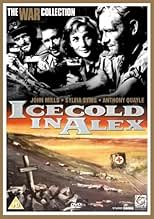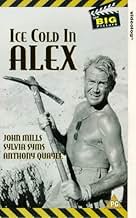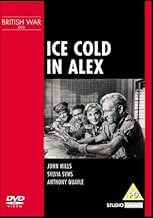IMDb RATING
7.7/10
7.2K
YOUR RATING
During World War II in North Africa, a medical field unit must cross the desert in their ambulance in order to reach the British lines in Alexandria.During World War II in North Africa, a medical field unit must cross the desert in their ambulance in order to reach the British lines in Alexandria.During World War II in North Africa, a medical field unit must cross the desert in their ambulance in order to reach the British lines in Alexandria.
- Nominated for 4 BAFTA Awards
- 1 win & 5 nominations total
Brian Peck
- Corporal
- (uncredited)
Featured reviews
'Ice Cold in Alex' is an absorbing story of a British ambulance trying to get to safety in the North African desert. There is the heat, minefields, enemy troops, more heat, shifting sands and human weaknesses to contend with and at the end of the film (over two hours)one feels exhausted. The main characters are an army captain on the verge of a breakdown, a determined nurse, a solid sergeant major and a South African soldier whom they pick up on the way. With simple heroism they try making their way to their goal, which in this case is a glass of ice cold beer in Alexandria on the coast.
The interplay between the characters and the growing bond they have in adversity is well played by the actors. John Mills' deeply troubled captain is particularly well acted. Harry Andrews, Anthony Quayle and Sylvia Syms are fine too. The other main character is the ambulance itself, gradually coming to pieces on the way, steaming and bumping along.
J. Lee Thompson was a very able director and there are some excellent scenes here. The minefield scene near the beginning and the hill scene near the end are great, tense and emotional. The beer scene is moving and uplifting. The best British films about the Second World War are generally about a small group of ordinary people who faced with crisis and peril just get on with it.
The interplay between the characters and the growing bond they have in adversity is well played by the actors. John Mills' deeply troubled captain is particularly well acted. Harry Andrews, Anthony Quayle and Sylvia Syms are fine too. The other main character is the ambulance itself, gradually coming to pieces on the way, steaming and bumping along.
J. Lee Thompson was a very able director and there are some excellent scenes here. The minefield scene near the beginning and the hill scene near the end are great, tense and emotional. The beer scene is moving and uplifting. The best British films about the Second World War are generally about a small group of ordinary people who faced with crisis and peril just get on with it.
10cjlandon
I must confess to being biased towards this film, as I am a grandson of the author and screenwriter. It is extremely pleasing to read that this film has given a lot of pleasure to many who have seen it. Why I think the film succeeds is because it was written by a man who took part in the North African campaign, as a doctor in the RAMC, who had to deal with the human cost of war. People, and how they cope with adversity, is often more interesting than depicting warfare itself. This makes it an unusual war film for the time, to say the least. The character of Captain Anson, so ably played by John Mills, is telling for me as my grandfather sadly did have an alcohol problem later in life. On a lighter note, the terrific final scene in the bar has an amusing story attached to it - apparently, the scene had to be shot five or six times, and as nothing else looked like beer in a glass than, well, beer, poor John Mills had to keep knocking back the beers until the scene was "in the can"!
Ice-Cold in Alex is directed by J. Lee Thompson and is based on the novel of the same name written by Christopher Landon. The latter of which co-writes the screenplay with T.J. Morrison. It stars John Mills, Sylvia Syms, Anthony Quayle and Harry Andrews. Leighton Lucas provides the music and Gilbert Taylor photographs in black and white.
World War II and the British base at Tobruk, Libya, is attacked by the German Afrika Korps. During the evacuation 4 personnel are tasked with the mission to drive an ambulance across the desert back to British lines in Alexandria in Egypt. Captain Anson (Mills), MSM Tom Pugh (Andrews), Nurse Diana Murdoch (Syms) and Nurse Denise Norton (Diane Clare) are the four people in question, soon to be joined by a South African officer, Captain van der Poel (Quayle). Poel seems shifty, but his physicality and supply of Gin will no doubt be handy on this arduous trip. And arduous it will prove, as the elements, Germans and inner conflict will all test the group to the limit.
It falls under the war movie banner, but the truth is that Ice-Cold in Alex is a different sort of animal. The core of Landon's story is to observe how a different group of characters cope in the face of mental and physical hardships. The war and the desert landscapes form the backdrop, but this is in essence a character study where the characters are defined by their actions. Thankfully the group of actors on show are able to turn in great shows to not let the slow structure of the film be a hindrance. Mills and Quayle especially bring a dynamic to their characters, drawing the viewer into the desert with them in the process. A number of quality scenes stand out in the picture, be it involving quicksand or trying to get "Katy" the ambulance over a hill, the tension mounts and the film never wants for effective drama. While the finale crowns the picture in a wave of humanistic collectedness. 8/10
World War II and the British base at Tobruk, Libya, is attacked by the German Afrika Korps. During the evacuation 4 personnel are tasked with the mission to drive an ambulance across the desert back to British lines in Alexandria in Egypt. Captain Anson (Mills), MSM Tom Pugh (Andrews), Nurse Diana Murdoch (Syms) and Nurse Denise Norton (Diane Clare) are the four people in question, soon to be joined by a South African officer, Captain van der Poel (Quayle). Poel seems shifty, but his physicality and supply of Gin will no doubt be handy on this arduous trip. And arduous it will prove, as the elements, Germans and inner conflict will all test the group to the limit.
It falls under the war movie banner, but the truth is that Ice-Cold in Alex is a different sort of animal. The core of Landon's story is to observe how a different group of characters cope in the face of mental and physical hardships. The war and the desert landscapes form the backdrop, but this is in essence a character study where the characters are defined by their actions. Thankfully the group of actors on show are able to turn in great shows to not let the slow structure of the film be a hindrance. Mills and Quayle especially bring a dynamic to their characters, drawing the viewer into the desert with them in the process. A number of quality scenes stand out in the picture, be it involving quicksand or trying to get "Katy" the ambulance over a hill, the tension mounts and the film never wants for effective drama. While the finale crowns the picture in a wave of humanistic collectedness. 8/10
This taut, engrossing and exciting war drama is more a fascinating character study than just another WWII film. Made in the sweltering heat of the northern Sahara Desert of Libya, I found myself sitting up until 2 am to see it through to the end, enjoying every minute of it, feeling like I was experiencing every task of the events in the story along with the characters.
The story tells of ambulance corps officer played by John Mills named Captain Anson, whom the war has driven to drink, who is unwillingly ordered to leave besieged Tobruk before the Germans break through and take the strategically important town over. In his ambulance he takes with him two young nurses, along with the stalwart Sergeant Major Tom Pugh played by Harry Andrews, and heads out across the desert for Alexandria in Egypt. Their journey leads them through many obstacles, and along the way they pick up the enigmatic South African army officer, Captain van der Poel (van-der-POO-el he corrects them in his distinctly Afrikaner accent) played by Anthony Quayle, who has become detached from his unit and is looking for a lift. Can they beat the elements of the desert and make it to Alexandria, where Anson knows of a certain bar that serves the ice cold lager he so longs for and promises the others?
In height and build Mills is a much smaller next to big men like Andrews and Quayle, but I was very impressed with how his strong acting and personal inner character make him seem as tall and broad shouldered as the other two. I also admired how the whole cast put their all into the many no doubt very difficult scenes, obviously having to deal with the physically exhaustive work that was asked of them, the tortuous heat and sand fleas nipping at their legs. I could see they were feeling the affects and that adds to the realism of the whole film. Note even the lovely Sylvia Syms as the seemingly unshakable nurse Sister Diana Murdoch, didn't avoid having to look hot, sweaty and bothered like her male co-stars, unlike some Hollywood actresses of that time who I will not even mention. That and the ambulance must have been an oven during the whole shoot.! A truly unique film and worth the whole gripping two hours.
The story tells of ambulance corps officer played by John Mills named Captain Anson, whom the war has driven to drink, who is unwillingly ordered to leave besieged Tobruk before the Germans break through and take the strategically important town over. In his ambulance he takes with him two young nurses, along with the stalwart Sergeant Major Tom Pugh played by Harry Andrews, and heads out across the desert for Alexandria in Egypt. Their journey leads them through many obstacles, and along the way they pick up the enigmatic South African army officer, Captain van der Poel (van-der-POO-el he corrects them in his distinctly Afrikaner accent) played by Anthony Quayle, who has become detached from his unit and is looking for a lift. Can they beat the elements of the desert and make it to Alexandria, where Anson knows of a certain bar that serves the ice cold lager he so longs for and promises the others?
In height and build Mills is a much smaller next to big men like Andrews and Quayle, but I was very impressed with how his strong acting and personal inner character make him seem as tall and broad shouldered as the other two. I also admired how the whole cast put their all into the many no doubt very difficult scenes, obviously having to deal with the physically exhaustive work that was asked of them, the tortuous heat and sand fleas nipping at their legs. I could see they were feeling the affects and that adds to the realism of the whole film. Note even the lovely Sylvia Syms as the seemingly unshakable nurse Sister Diana Murdoch, didn't avoid having to look hot, sweaty and bothered like her male co-stars, unlike some Hollywood actresses of that time who I will not even mention. That and the ambulance must have been an oven during the whole shoot.! A truly unique film and worth the whole gripping two hours.
I am not a great fan of war genre, but this film is brilliant for several reasons. First of all the film is well acted by a cast who know what good acting is. This can be particularly said of the late Sir John Mills; a dedicated actor who really knew how to play all his characters well.
The film is also great for its suspense, which kept me gripped all the way to Alexandria.
However, what makes the film stand out, is how the adversity of a hostile environment, such as the dessert brings out the positive qualities of human nature, which serve to unite man -and woman -kind. This puts the idea of war into perspective as insignificant when faced with nature's raw and hostile conditions. It illustrates that as humans we need to unite and work together to combat adversity, while respecting the power of nature.
The film is also great for its suspense, which kept me gripped all the way to Alexandria.
However, what makes the film stand out, is how the adversity of a hostile environment, such as the dessert brings out the positive qualities of human nature, which serve to unite man -and woman -kind. This puts the idea of war into perspective as insignificant when faced with nature's raw and hostile conditions. It illustrates that as humans we need to unite and work together to combat adversity, while respecting the power of nature.
Did you know
- TriviaFilmed in Libya, as Egypt was ruled out due to the recent Suez Crisis. Filming began 10 September 1957.
- GoofsIn the very last scene, as Lutz is being driven away from the bar by the British military police, a Land Rover can be seen parked next to the bar. The first Land Rovers were produced in 1948, six years after the battle of Tobruk.
- Quotes
Capt. Anson: I'll tell you this, the next drink I have's gonna be a lager. Ice cold. There's a little bar in Alex with a marble top counter and high stools. They serve the best beer in all the middle east. When we get through with this lot I'm gonna buy you one. I'll buy you all one.
- Crazy creditsOpening credits prologue: TOBRUK - 1942
- Alternate versionsOriginal British version, "Ice Cold in Alex," runs 130 minutes. U.S. distributor shortened the film in 1961 to 76 minutes and released it as "Desert Attack."
- SoundtracksMy Old Man (Said Follow the Van)
[uncredited]
Written (1919) by Fred W. Leigh and Charles Collins
Sung by John Mills, Sylvia Syms and Harry Andrews
- How long is Ice Cold in Alex?Powered by Alexa
Details
- Runtime
- 2h 10m(130 min)
- Color
- Aspect ratio
- 1.66 : 1
Contribute to this page
Suggest an edit or add missing content




































